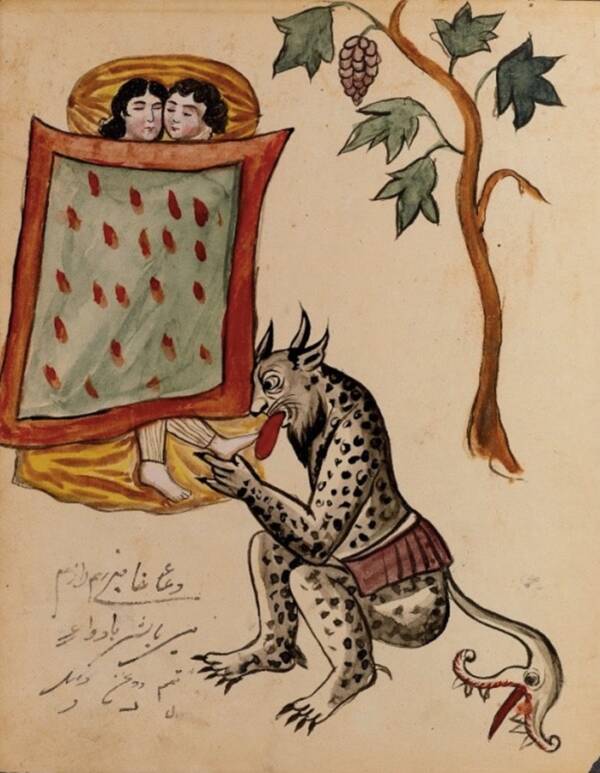
On Demons and The Theft of Language
We spend a lot of time writing things about our worlds that don’t quite fit in the pages of a book — especially history and mythology that shape how characters act, but are peripheral to the plot. Here, we’re going to share one such myth from the world of Broken Tongues. While the book draws heavily from real myths such as Babel and the Flood, it also needed ones unique to this own alternative world and timeline.
In the era most of Broken Tongues is set in, the world is officially completely secular according to the dominant global power, Alu-Belium. A quasi-religious pursuit of knowledge and industry has replaced gods and mysticism. But just because the government pretends myths don’t exist doesn’t mean they didn’t shape the world or that nobody remembers them. This particular myth is about the creation of a demon whose name became a derogatory synonym for one of the antagonists in the book: the Lisankubim, more properly called the Language Synchronicity Board. The Lisankubim function as a special force policing thought and language in order to ensure their single, globally dominant Language stays pure and efficient and not bogged down with dangerous, unnecessary words like “Love” and “Poetry” and “Rebellion.”
The narrator in this piece is a patron performing at what might be called an open mic in an illegal speakeasy: a place of glamorous dress and of experimentation in word and drink and food, decorated in recovered artifacts from freer times. The narrator recounts the myth to her fellow dissidents by speaking aloud rather than through her neural interface to avoid drawing the attention and wrath of the Lisankubim.
The Creation of the Lisankubim
The Lisankubim, those power hungry idiots who seek to silence us. Everyone here knows the word. Most probably know it’s referencing some old myth, and that the moniker implicitly even accuses our would-be rulers of being dark spirits come to life. How many know that ancient myth, though? The story of those ancient voice-stealing demons of the tongue? Well, as luck would have it, I happened across that very tale, so here I am to give you the original story.
In ancient times, when human minds still made mighty gods and demons, there was a powerful king. This king ruled a vast land, and was as well-liked by his people as a king could be. For the most part, he was a just and reasonable man, and worked to do well by his people. But – there’s always a but isn’t there? If there weren’t a but there wouldn’t be a story – but, this king had a younger sister. His sister was fair and kind, and free of the responsibility of rulership, she could devote her time to helping the people. She worked to create schools to better educate the good citizens of the land, and held festivals where all could have their fill of fine wine and food, and generally she did all she could to be an ambassador from the royal family to the common folk.
At first the king was grateful for his sister, because her good works made his subjects more obedient and devoted towards all the royal family. Over the years though, the king became jealous of his sister’s place in the people’s hearts, and he wanted all their adoration for himself alone.
So, the king turned to one of his counselors, a powerful sorcerer, to find some magic he could use to steal the people’s love of his sister for himself. This sorcerer promised the king he would find a solution, and he spent the next year poring through all manner of knowledge. He read countless scrolls of science and magic, and he ran many tests to verify the claims he found within them. In all that vast accumulated wisdom, wisdom from their own kingdom and wisdom from all those the kingdom traded with, he found no method to directly control the people’s devotion. But in a hidden temple library dedicated to the dark god Nergal, he found a solution he thought might do the job.
Now, during this time, the sorcerer was also spying on the king’s sister, closely monitoring her interactions with the good-hearted common people, in the hopes of understanding the devotion they bore her well enough to capture it and steal it. Unfortunately for him, the sorcerer found the limits of his wisdom, and neither the princess’s nature and actions nor the people’s response to her were things the sorcerer could fathom. Instead, watching her kindled in him a lust and a desire to possess her for himself, much as doing so had kindled jealousy in the king before him. With his mind fueled by unhealthy passion and steeped in dark lore, the sorcerer hatched a plan.
To the king, he said, “Lord, I have discovered a way by which we can turn all the devotion of your subjects to your sister to focus instead on you. The secret is in her name, which the benighted common people have come to idolize and fetishize. In my studies over this last year, I believe I have found a way to capture her given name, leaving her only her family name, which is also your name. Then you can step in and take her place in their hearts and minds, the only bearer of the single name they have for their love.”
The king at first looked horrified, but the strength of his jealousy quickly turned his horror to curiosity. “How will you capture her name? And what will become of her? I have no desire to see her harmed.”
“My lord, I can’t say the process will be painless for her, but I will do all I can to make it as easy on her as possible, and I will whisk her away from the kingdom myself after it is over. As for how, I have learned the secret for making a demon that will devour the thing for which it hungers, and I have also learned how to make it hunger for a word. The object of its desire could be anything, but in this case, it will yearn to consume her name. To endow this demon with the necessary strength, though, I will need your sister’s child.”
“My sister’s child! But she has never been with child, nor shown any interest in marriage!”
“With your permission, sire, I will take care of everything, and you will need worry yourself with it no more.”
To his slim credit, the king could not bring himself to agree immediately. Instead, he asked his sister to join him for dinner that night, to see if he could find it in himself to accept her as she was. At dinner, he could scarcely bring himself to look at her, for anytime he did he saw not his sister but an obstacle to his own success, and he felt the weight of guilt for a decision he knew he had already made.
At the first light of dawn, he sent a message to his counselor saying simply, “Do what you must.”
The sorcerer wasted no time in enacting his plan. He had seen while spying on her that the princess had secretly taken a teacher at one of her schools as a companion, but mindful of her station, she took careful measures to stay childless. It was a trivial matter for his magics to cause her methods to fail, and soon she was with child.
He then sought her out and told her he could help her hide her pregnancy. Having decided she wanted to bear the child, she was at first grateful for any help his magics could provide. Over the course of her pregnancy, he fed her all manner of foul potions, potions that he had learned to make from the Death god’s library, telling her always that this was what it took to maintain her life and her name while carrying her child. Through his magics, the fetus grew, but she never showed a sign of it, and in her gratitude she promised him that whatever she could give to repay him would be his. So great were the lust and the greed that arose in him that he almost let his mask of kindness slip. But he bound her promise with a spell, a spell so terrible and powerful that she could not take it back.
When at last the day came for her child to be born, the sorcerer was on hand to deliver it. The princess knew something was wrong when the child emerged into the light, but there was no sound. The sorcerer began to chant, and to draw strange runes upon the child. Afraid, the princess grabbed for the child, but recoiled in horror when she felt the cold, dead form, a lifeless doll that the sorcerer gently cradled in his arms. Seeing the look of joy on his face, the princess at last knew that she had been tricked, and she tried to flee. But the sorcerer held up a hand and she froze.
“Not so fast, princess, you promised me anything I wanted would be mine, and so it is, for what I want is you. And here, with me, you will stay.”
The princess collapsed in tears, bound by the magic woven with her own words, while the sorcerer performed his spell on the stillborn child. As the planet slowly rotated, one whole rotation on its axis and more, the ritual went on. At last, he took the tongue of the child and placed it in a leather pouch, and with it put a stone carved with the princess’s name – not just her given name as he had promised the king, but her full name. A dark form took shape around the pouch, no larger than a baby, an indistinct form that floated between the princess and the sorcerer. To test his magic, the sorcerer attempted to speak her name, but no sound came out. He laughed in triumph, sure that the kingdom and princess would both now be his.
He had made a terrible mistake, though, and as he laughed the princess felt the bonds upon her falter and fade, and her rage was set free. For the spell the sorcerer had used to bind her words had rested upon her name, and the new demon, the Lisankubim, consumed the spell along with her name. In her fury, she slew the sorcerer, but could not bring herself to destroy what little was left of the child she had so hoped for, the child who bore her name that none would ever know again.
From that day forward, she wore the magic pouch around her neck, and felt the dark form in her chest. Her brother, in his anguish over what he, in his jealousy, had set in motion, abdicated his throne, and she declared herself Queen Minimmenat, the Queen who is nobody. She ruled well for many years, and when she died she ordered that the pouch of the Lisankubim be buried with her, in the hope that the dark art of making it would stay, locked forever in her tomb.





